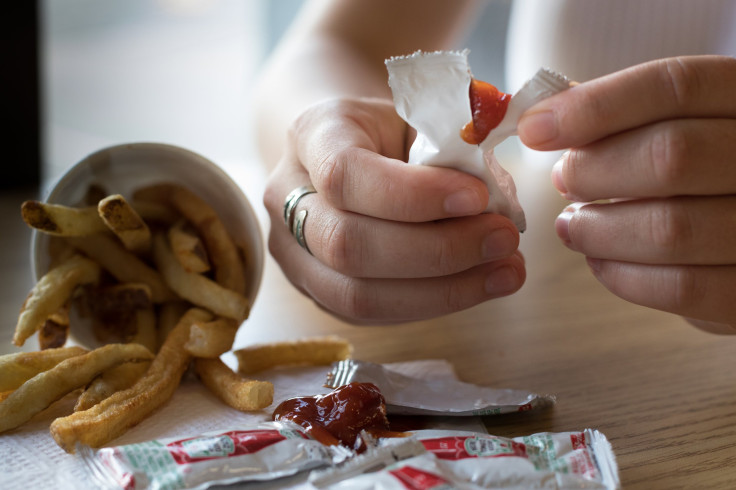Preventing Food Wastage: New Packaging Could Reduce Inadvertent Waste

As the problem of food wastage continues to increase, a group of scientists has come up with a new type of packaging, one that makes it easier to squeeze everything out of a packet of ketchup, yogurt, or any other food material.
If you prefer nice condiments with any dish, you should know how frustrating it is to extract the last drop of ketchup from an incredibly small packaging. People usually squeeze out as much as they can and throw away the rest as waste. However, even that small amount of ketchup that was thrown away and other similar foodstuff contribute to the millions of pounds of food thrown away across the globe.
The problem has existed for years, but now, researchers from Virginia Tech have developed novel SLIPS or slippery liquid-infused porous surfaces, to deal with it.
First developed by researchers at Harvard nearly seven years ago, SLIPS were plastics drenched in chemically compatible vegetable oils. The plastic carries a certain roughness which holds on to the oil and retains sufficient lubrication for easy removal of viscous liquids.
Though it was proven that packages made from this technique could prevent food wastage, there were some major caveats back in the day. Essentially, the oil compatible plastics used for the process were silicon or fluorine-based polymers, which were extremely expensive and not widely used in industrial packaging processes.
In addition, the roughness required to hold the lubricant added further cost. It was induced either by applying an additional coating or by developing polymers carrying nano-scale roughness at the molecular level.
The problems persisted for years, but Virginia Tech designed their SLIPS with hydrocarbon-based plastics such as polyethylene and polypropylene. These materials make up 55 percent of the plastics in demand, are relatively cheap and can be recycled very easily.
“We had two big breakthroughs. Not only are we using these hydrocarbon-based polymers that are cheap and in high demand, but we don’t have to add any surface roughness, either,” Jonathan Boreyko, the co-author of the work, said in a statement. “We actually found oils that are naturally compatible with the plastics, so these oils are wicking into the plastic itself, not into a roughness we have to apply.”
While the researchers stated their SLIPS won’t be of any harm to the consumers, they did note the widespread use of plastics involved in this process could ensure its application into many other industries. For instance, the pharma industry could use SLIPS for their anti-fouling capabilities, which prevent bacterial growth.
“We’re not adding any mystery nanoparticles to the surfaces of these plastics that could make people uncomfortable,” Boreyko added. “We use natural oils like cottonseed oil, so there are no health concerns whatsoever. There’s no fancy recipe required.”
The study titled “Oil-Impregnated Hydrocarbon-Based Polymer Films,” was published August 3 in the journal Scientific Reports.
© Copyright IBTimes 2024. All rights reserved.





















